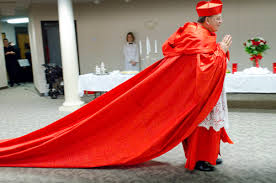
The Disconnect Between Religion and “Real Life”
There’s a certain American archbishop and cardinal, who until his dismissal by Pope Francis in 2014, had an important post in the Vatican. On several occasions, he was photographed in his scarlet robes with a “train,” the long fabric that flows from the cape around the neck, swirling at the feet and extending for several yards.
Often in these photos, a cleric of lower rank is shown holding the end of the train, much like servants would have done several centuries ago for a prince. Indeed, cardinals are often referred to as “princes of the church.”
When looking at such pictures, or seeing the reality in person, you have to ask yourself, “Is this what Jesus had in mind,” this Jesus who said he came to serve, not to be served; who derided how pagan leaders “lorded it over” each other; who told his disciples that “whoever exalts himself will be humbled, and whoever humbles himself will be exalted?”
A Caste Apart?
Clericalism, the inclination of some members of the clergy to consider themselves a caste apart from lay people,” is a special risk in Catholicism. It’s partly to blame, I believe, for today’s priest shortage. How many modern men are attracted to that medieval way of looking at the church?
It also results in the bewilderment of lay people in the absence of clergy. How can we get along without “Father,” who has always made all the important decisions? And as more lay people attempt to fill in the leadership gap, many among the clergy resist their perceived loss of power.
The liturgical dress of church leaders is not among the most consequential aspects of clericalism, but it is among its powerful symbols. It is one of many symbols, language and other realities that signal a disconnect between religion and “real life.”
This disconnect is evident in church services and homilies, too. Writes Jesuit Father Thomas Reese in a recent edition of the National Catholic Reporter: “Current liturgical worship requires that we park our scientific minds at the church door and enter into the pre-scientific world of our ancestors when we pray.”
Still, the clergy’s apparent exclusion of science or the way clerics dress or even the clericalism in the church aren’t, in my view, good reasons for rejecting religion, including the Catholic faith. Religion is among the most obvious and helpful ways of searching for God. And despite the existence of clericalism, the majority of clerics, at least in my experience, are faith-filled people who are great teachers and models for people searching for God.
The disconnect that seems so insurmountable to people who reject religion shouldn’t be ignored, however. Elizabeth Drescher, adjunct associate professor of Religious Studies at Santa Clara University, wrote a book called “The Spiritual Lives of America’s Nones,” based on her research into the nones’ beliefs about religion. The book was reviewed in America Magazine last year.
“Nones,” as those who regularly read this blog may recall, are people who answer “none” when asked in questionnaires to identify religious affiliation. A large number of “nones” are under 40. Among the points Drescher identifies as hallmarks of nones’ view of religion.
- New technology reorients affiliation and spiritual engagement to be networked, provisional, pluralistic and pragmatic, and no longer hierarchical and prescribed;
- Caring compassion transcends ideology or theology as the core of a meaningful spiritual life.
The first point emphasizes freedom of thought and affiliation, facilitated by social media. This, in my opinion, reflects rejection of what many young nones feel is the imposition of religion by older generations.
Even though many “nones” may not acknowledge it, the second point reflects, I believe, the loving care learned from their parents’ religions in religious education classes and religious schools, the idea that love rules. But it also reflects a repudiation of doctrine and theology, which have from all reports been de-emphasized in those same classes and training. What is missing is the realization that the former flows from the later.
In every historical period, trends have had good and bad influences on belief. Today’s opinions about religion reflect our own views and biases, including today’s extreme individualism.
Robs You of Freedom?
Among the most dominant views of religion, especially among the young, is that religion robs you of freedom. But many people who have found God note just the opposite, a sense of freedom from the worn-out presumptions of the modern world and the self-satisfied attitude they promote.
In his famous book, “The Seven-Story Mountain,” Trappist monk Thomas Merton tells of his conversion from a sort of mid-20th century playboy to a practicing Christian.
“There was in me,” he writes about the time after he found God, “the profound, sure certitude of liberty, the moral certitude of grace, of union with God, which bred peace that could not be shattered or overshadowed by an necessity to stand armed and ready for conflict. And this peace was all-rewarding. It was worth everything.”




